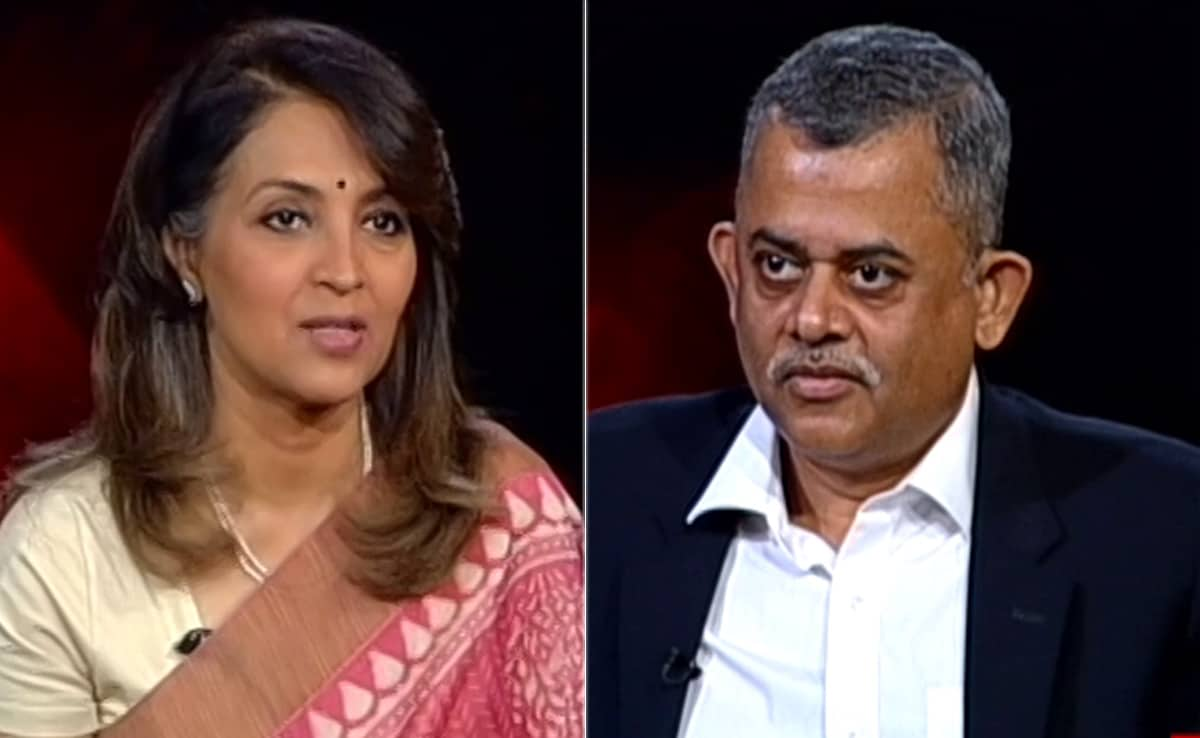
Mr Mishra said fertility rate is falling in India and net savings are increasing.
New Delhi:
The United States may see a deep recession soon, and such a scenario would impact not only India’s services sector, which is a key component of the country’s GDP, but also bring about a lot of volatility in the bond and equity markets, a top economist has said.
In an exclusive conversation with NDTV, Neelkanth Mishra, who is the Chief Economist for Axis Bank and the part-time chairperson of the Unique Identification Authority of India, said the United States was expected to enter a recession this year and it was thought its GDP growth would fall, but that did not happen. By the end of September, people thought that there would be a “soft landing” and there would not be a recession.
“Our analysis says however that, this year, their fiscal deficit has gone up by 4% of their GDP. They had targeted $1 trillion – their fiscal year ends on September 30 – and they ended up with a figure of $2 trillion. If the fiscal deficit is so high, there can’t be a recession. The problem for them, however, is that if they don’t keep increasing the fiscal deficit, they can’t sustain the economy’s growth,” Mr Mishra said.
“Even if they manage to keep the fiscal deficit flat next year, which is a problem in itself, the economy will go into a recession. Because of the fiscal deficit being so high, no one is wanting to buy US bonds. Rates are rising because of that, and this is going to lead to a contraction in demand across the world. So, the recession that will happen could be a very deep one,” he warned.
India Impact
Asked about how this could impact India, Mr Mishra said the effects could be felt through four pathways. Services growth, which is already slow, would get slower.
“If the US sees a recession. Our IT services industry and our business services exports could be hit. Services exports make up 10% of India’s exports. If they fall a lot, we could lose 1% of GDP growth,” he said.
The second pathway is the impact on goods exports. The economist said goods demand will fall. “It is already low in China, Europe and Japan and was above trend in the US. This could affect India’s goods exports,” he warned.
The bigger risk, he said, is dumping of products in India. Mr Mishra pointed out that If India remains the only country where demand is resilient, every manufacturer would like to sell here. This would adversely affect Indian manufacturers.
The fourth problem is that a US recession would affect the yield on its government bond.
“Cost of capital would go up for the other economies. Good borrowers in India, like famed steel companies, would get dollar loans easily earlier. But such loans have not been available for the past 6-8 months. This would bring about a lot of volatility in financial markets like bond markets and equity markets,” he said.
Preparing The Country
“Price of crude oil has already started falling in the past two-three days because people have started fearing a recession. If the US goes into a recession in May-June next year, oil prices will come down. On the other hand, if oil prices rise, it will have a negative impact on the Indian economy,” he added.
On the steps India can take to tackle all of this, Mr Mishra said the focus should be on macroeconomic stability, as opposed to risk-taking, to be able to deal with the waves of turbulence. “Macroeconomic stability gives you growth for a longer term,” he asserted.
State Vs Centre
Asked about Morgan Stanley’s report stating that if India gets a stable government after 2024, the stock market will rise by 10% and could fall by 20-60% if that does not happen, the economist said this is a very wrong way of thinking.
“The impact of the central government on the economy comes in the medium term. It can be seen in a big way, but in 3-5 years. State governments have a bigger role to play in the near-term economic momentum – whether investments are being done by foreign and private companies – and this will not change,” Mr Mishra said.
He pointed out that the fertility rate is falling in India and the net savings are increasing.
“This is being seen in the increased investment in equity markets – 30-35 billion dollars are being invested each year. A change in government will not affect this. Housing construction is behind this current strength in India’s economy, and this will not change either. Nobody will stop building their house if the government changes. According to me, this kind of sensationalist forecast is totally wrong,” he said.
What The Middle Class Should Do
On whether he has any advice for the middle class, Mr Mishra said, “The next year or year-and-a-half will be very turbulent for the global economy. If we are lucky, that is. If not, it could extend to five years. I would advise precaution. Looking at the Indian economy in the next 5-7 years, I don’t see too much of a cause for worry. Its trajectory looks good for now.”




